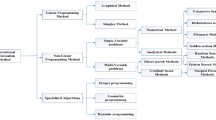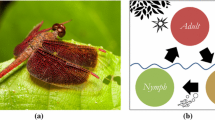Abstract
Similar to other swarm-based algorithms, the recently developed whale optimization algorithm (WOA) has the problems of low accuracy and slow convergence. It is also easy to fall into local optimum. Moreover, WOA and its variants cannot perform well enough in solving high-dimensional optimization problems. This paper puts forward a new improved WOA with joint search mechanisms called JSWOA for solving the above disadvantages. First, the improved algorithm uses tent chaotic map to maintain the diversity of the initial population for global search. Second, a new adaptive inertia weight is given to improve the convergence accuracy and speed, together with jump out from local optimum. Finally, to enhance the quality and diversity of the whale population, as well as increase the probability of obtaining global optimal solution, opposition-based learning mechanism is used to update the individuals of the whale population continuously during each iteration process. The performance of the proposed JSWOA is tested by twenty-three benchmark functions of various types and dimensions. Then, the results are compared with the basic WOA, several variants of WOA and other swarm-based intelligent algorithms. The experimental results show that the proposed JSWOA algorithm with multi-mechanisms is superior to WOA and the other state-of-the-art algorithms in the competition, exhibiting remarkable advantages in the solution accuracy and convergence speed. It is also suitable for dealing with high-dimensional global optimization problems.
















Similar content being viewed by others
References
Shi Y, Eberhart RC (2002) Empirical study of particle swarm optimization. In: Congress on evolutionary computation
Das S, Suganthan PN (2011) Differential evolution: a survey of the state-of-the-art. IEEE Trans Evol Comput 15(1):4–31
Geem ZW, Kim JH, Loganathan GV (2001) A new heuristic optimization algorithm: harmony search. Simulation 76(2):60–68. https://doi.org/10.1177/003754970107600201
Dorigo M, Birattari M, Stutzle T (2007) Ant colony optimization. IEEE Comput Intell Mag 1(4):28–39
Karaboga D, Basturk B (2007) A powerful and efficient algorithm for numerical function optimization: artificial bee colony (ABC) algorithm. J Global Optim 39(3):459–471
Dan S (2008) Biogeography-based optimization. IEEE Trans Evol Comput 12(6):702–713
Pan WT (2012) A new fruit fly optimization algorithm: taking the financial distress model as an example. Knowl Based Syst 26(2):69–74
Arora S, Singh S (2018) Butterfly optimization algorithm: a novel approach for global optimization. Soft Comput 3:1–20
Rashedi E, Nezamabadi-Pour H, Saryazdi S GSA (2012) A gravitational search algorithm. In: International Econference on computer and knowledge engineering
Mirjalili S (2015) Moth-flame optimization algorithm: a novel nature-inspired heuristic paradigm. Knowl Based Syst 89:228–249. https://doi.org/10.1016/j.knosys.2015.07.006
Mirjalili S, Mirjalili SM, Lewis A (2014) Grey wolf optimizer. Adv Eng Softw 69:46–61. https://doi.org/10.1016/j.advengsoft.2013.12.007
Shehab M, Khader AT, Al-Betar MA (2017) A survey on applications and variants of the cuckoo search algorithm. Appl Soft Comput 61:S1568494617301278
Mirjalili S (2016) SCA: a sine cosine algorithm for solving optimization problems. Knowl Based Syst 96:120–133. https://doi.org/10.1016/j.knosys.2015.12.022
Mirjalili S, Mirjalili SM, Hatamlou A (2015) Multi-verse optimizer: a nature-inspired algorithm for global optimization. Neural Comput Appl 27(2):495–513. https://doi.org/10.1007/s00521-015-1870-7
Mirjalili S, Gandomi AH, Mirjalili SZ, Saremi S, Faris H, Mirjalili SM (2017) Salp swarm algorithm: a bio-inspired optimizer for engineering design problems. Adv Eng Softw 114:163–191. https://doi.org/10.1016/j.advengsoft.2017.07.002
Heidari AA, Mirjalili S, Faris H, Aljarah I, Mafarja M, Chen H (2019) Harris hawks optimization: algorithm and applications. Future Gener Comput Syst 97:849–872. https://doi.org/10.1016/j.future.2019.02.028
Mirjalili S, Lewis A (2016) The whale optimization algorithm. Adv Eng Softw 95:51–67. https://doi.org/10.1016/j.advengsoft.2016.01.008
Sahu PR, Hota PK, Panda S (2018) Power system stability enhancement by fractional order multi input SSSC based controller employing whale optimization algorithm. J Electr Syst Inf Technol 5:326
Hasanien HM (2018) Performance improvement of photovoltaic power systems using an optimal control strategy based on whale optimization algorithm. Electr Power Syst Res 157(4):168–176
Azizi M, Ejlali RG, Mousavi Ghasemi SA, Talatahari S (2019) Upgraded whale optimization algorithm for fuzzy logic based vibration control of nonlinear steel structure. Eng Struct 192:53–70. https://doi.org/10.1016/j.engstruct.2019.05.007
Moodi Y, Mousavi SR, Ghavidel A, Sohrabi MR, Rashki M (2018) Using response surface methodology and providing a modified model using whale algorithm for estimating the compressive strength of columns confined with FRP sheets. Constr Build Mater 183:163–170
Mousavirad SJ, Ebrahimpour-Komleh H (2017) Multilevel image thresholding using entropy of histogram and recently developed population-based metaheuristic algorithms. Evol Intel 10(1–2):45–75
Aziz MAE, Ewees AA, Hassanien AE (2017) Whale optimization algorithm and moth-flame optimization for multilevel thresholding image segmentation. Expert Syst Appl 83:242–256
Gharehchopogh FS, Gholizadeh H (2019) A comprehensive survey: whale optimization algorithm and its applications. Swarm Evol Comput 48:1–24. https://doi.org/10.1016/j.swevo.2019.03.004
Trivedi IN, Jangir P, Kumar A, Jangir N, Totlani R (2018) A novel hybrid PSO–WOA algorithm for global numerical functions optimization. Adv Comput comput Sci 554:53–60. https://doi.org/10.1007/978-981-10-3773-3_6
Korashy A, Kamel S, Jurado F, Youssef A-R (2019) Hybrid whale optimization algorithm and grey wolf optimizer algorithm for optimal coordination of direction overcurrent relays. Electric Power Compon Syst 47:644–658. https://doi.org/10.1080/15325008.2019.1602687
Mafarja MM, Mirjalili S (2017) Hybrid whale optimization algorithm with simulated annealing for feature selection. Neurocomputing 260:302–312
Khalilpourazari S, Khalilpourazary S (2018) SCWOA: an efficient hybrid algorithm for parameter optimization of multi-pass milling process. J Ind Prod Eng 35(3):135–147
Kaur G, Arora S (2018) Chaotic whale optimization algorithm. J Comput Des Eng 5(3):275–284. https://doi.org/10.1016/j.jcde.2017.12.006
Ismail SG, Ashraf D, Ella HA (2018) A new chaotic whale optimization algorithm for features selection. J Classif 35(2):300–344
Zhou Y, Ling Y, Luo Q (2017) Lévy flight trajectory-based whale optimization algorithm for global optimization. IEEE Access 5:6168–6186
Abd Elaziz M, Oliva D (2018) Parameter estimation of solar cells diode models by an improved opposition-based whale optimization algorithm. Energy Convers Manag 171:1843–1859. https://doi.org/10.1016/j.enconman.2018.05.062
Hassanien AE, Elfattah MA, Aboulenin S, Schaefer G, Korovin I Historic (2016) Handwritten manuscript binarisation using whale optimisation. In: The 2016 IEEE international conference on systems, man, and cybernetics (SMC 2016)
Sivalingam R, Chinnamuthu S, Dash SS (2017) A modified whale optimization algorithm-based adaptive fuzzy logic PID controller for load frequency control of autonomous power generation systems. Automatika 58(4):410–421. https://doi.org/10.1080/00051144.2018.1465688
Wang J, Du P, Niu T, Yang W (2017) A novel hybrid system based on a new proposed algorithm—multi-objective whale optimization algorithm for wind speed forecasting. Appl Energy 208:344–360. https://doi.org/10.1016/j.apenergy.2017.10.031
Haupt RL, Haupt SE (1998) Practical genetic algorithms. Wiley, London
Shi Y, Eberhart R (1998) A modified particle swarm optimizer. In: 1998 IEEE international conference on evolutionary computation proceedings. IEEE world congress on computational intelligence (Cat. No.98TH8360), 4–9 May 1998, pp 69–73. https://doi.org/10.1109/icec.1998.699146
Tizhoosh HR (2005) Opposition-based learning: a new scheme for machine intelligence. In: International conference on computational intelligence for modelling, control and automation and international conference on intelligent agents, web technologies and internet commerce (CIMCA-IAWTIC’06). IEEE, pp 695–701
Seif Z, Ahmadi MB (2015) An opposition-based algorithm for function optimization. Eng Appl Artif Intell 37:293–306
Digalakis JG, Margaritis KG (2001) On benchmarking functions for genetic algorithms. Int J Comput Math 77(4):481–506
Acknowledgements
This paper is supported by Nation Science Foundation of China (No. 41404008), Fuzhou Science and Technology Project (No. 2017-G-73), Guiding Project of Fujian Science and Technology Program (No. 2018Y0021), Open Foundation of Key Laboratory for Digital Land and Resources of Jiangxi Province (No. DLLJ201911).
Author information
Authors and Affiliations
Corresponding author
Additional information
Publisher's Note
Springer Nature remains neutral with regard to jurisdictional claims in published maps and institutional affiliations.
Rights and permissions
About this article
Cite this article
Fan, Q., Chen, Z., Li, Z. et al. A new improved whale optimization algorithm with joint search mechanisms for high-dimensional global optimization problems. Engineering with Computers 37, 1851–1878 (2021). https://doi.org/10.1007/s00366-019-00917-8
Received:
Accepted:
Published:
Issue Date:
DOI: https://doi.org/10.1007/s00366-019-00917-8




